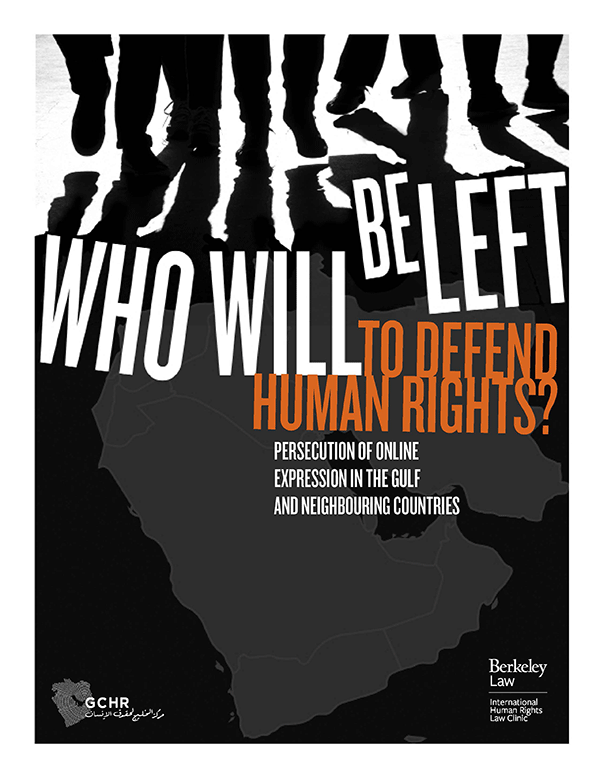 Human Right Defenders in the Gulf region and neighboring countries face an increasingly hostile environment for exercising their rights to freedom of expression online. A new report by Berkeley Law’s International Human Rights Law Clinic and the Gulf Centre for Human Rights, analyzes 225 incidents between May 2018 and October 2020, evidencing how governments in the region used anti-cybercrime and other criminal laws, along with specialized law enforcement institutions, to target online expression in violation of international law.
Human Right Defenders in the Gulf region and neighboring countries face an increasingly hostile environment for exercising their rights to freedom of expression online. A new report by Berkeley Law’s International Human Rights Law Clinic and the Gulf Centre for Human Rights, analyzes 225 incidents between May 2018 and October 2020, evidencing how governments in the region used anti-cybercrime and other criminal laws, along with specialized law enforcement institutions, to target online expression in violation of international law.
Released November 9, 2021, Who Will Be Left to Defend Human Rights? Persecution of Online Expression in the Gulf and Neighboring Countries provides a human rights analysis of the legal environment and its effects on human rights defenders in 10 countries: Bahrain, Iran, Iraq, Jordan, Kuwait, Oman, Qatar, Saudi Arabia, Syria, and the United Arab Emirates. In partnership with GCHR researchers, clinic Co-Director Laurel E. Fletcher and Teaching Fellow Astha Sharma Pokharel supervised the drafting of the report to which the following clinic students, as well as those who wish to remain anonymous, contributed: Sarah Abelow ’22, Blake Danser ’22, Ian Good ’22, A.L., B.L.N., H.V.N., S.O., Harriet Steele ’22, and Hailey Yook ’21.
States have enacted anti-cybercrime legislation that restricts and criminalizes protected online expression, including by extending the application of problematic penal restrictions existing in other laws to online communication and assembly. In addition, governments used against human rights defenders criminal defamation and insult laws, as well as vague and overbroad criminal prohibitions of expression that officials consider threatening to public order, national security, or other similar interests. Equipped with this broad legal arsenal, governments arrested, prosecuted, and imposed stiff sentences, including the death penalty, on defenders engaged in the legitimate and valuable activity of promoting human rights through online expression.
The report serves as a resource for activists, policy makers, and scholars working on these issues.
Read the full report
- Executive Summary and Introduction
- Bahrain
- Iran
- Iraq
- Jordan
- Kuwait
- Oman
- Qatar
- Saudi Arabia
- Syria
- United Arab Emirates
Read the Berkeley Law story
News stories
When did it become illegal to defend human rights?, OpenGlobalRights, 1/19/22
Human rights study shows increasing violations of freedom of online expression in Gulf Nations, The Daily Californian, 11/30/21